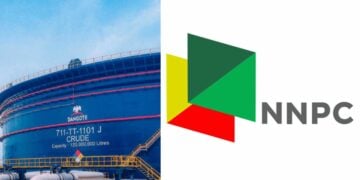Nigeria is solidifying its digital independence with over $1 billion in investments poured into local data centers and cloud infrastructure, signaling a transformative shift in the nation’s tech landscape.
With support from both the federal government and the private sector, the country is asserting its commitment to data sovereignty, digital resilience, and economic diversification.
The heart of Nigeria’s digital infrastructure surge is a significant financial commitment from both local and international players.
LEADERSHIP NEWSPAPER analysis revealed that, so far, over $1 billion has been earmarked or spent across multiple projects, each contributing to the country’s growing capacity.
For instance, MTN Nigeria is investing about $285 million in its Tier III Dabengwa Data Centre in Lagos, with $150 million on the first phase already completed and $135 million projected for the second.
Kasi Cloud Limited is investing $250 million in a hyperscale facility in Lekki. Open Access Data Centres (OADC) has committed $240 million toward the development of open-access, hyperscale infrastructure across Africa, with Nigeria as a key focus.
Additionally, MTN Nigeria has spent $150 million on its cloud platform and broader Tier III infrastructure efforts.
Beyond these major players, existing data centers; 11 in total, have attracted $230 million in cumulative investments, primarily concentrated in Lagos. When combined, these investments total $1.155 billion, marking a decisive financial leap in Nigeria’s journey toward digital sovereignty.
The minister of Communications, Innovation and Digital Economy, Dr. Bosun Tijani, said, “With infrastructure like this, we are keeping our data and capital local, reducing the need to spend scarce foreign exchange. It provides the digital backbone for key sectors such as fintech, healthcare, education, and AI. This is how we build national trust and ensure digital sovereignty.”
The minister emphasised that the initiative is aligned with President Bola Ahmed Tinubu’s vision of building a $1 trillion economy through productivity, innovation, and inclusivity. He also tied these facilities’ impact to broader national strategies, such as Project BRIDGE and the deployment of 7,000 communication towers in underserved areas, set to provide meaningful connectivity to over 20 million Nigerians still offline.
“Talent needs platforms. This infrastructure will enable startups, developers, and creators to scale their innovations from Nigeria to the world,” Tijani added.
“We are shaping the future of digital transformation in Nigeria. This is not just about infrastructure, it is about making Nigeria a digital hub for the region and the continent,” CEO of MTN Nigeria, Karl Toriola.
Toriola described the new facility as enterprise-grade, ESG-aligned, and fully compliant with local data protection laws, adding that with an initial capacity of 4.5 megawatts scalable to 14MW, it is designed for maximum uptime, redundancy, and security.
“We have built a sovereign, locally managed, globally competitive digital platform that empowers Nigerian businesses to scale faster and more securely,” he added.
The federal government’s commitment to local data hosting is not just economic, it is strategic. Representing the National Security Adviser (NSA), Mohamed Abdullahi Yawo stressed the importance of securing local infrastructure under Nigeria’s Critical National Information Infrastructure Order, recently signed into law.
“Data is the new oil, but we say data is life. We must secure our data within ourselves. This is not only an achievement; it is a critical national asset,” Yawo said.
He noted that the Center for National Cyber Security Coordination is developing protection protocols for such infrastructure, ensuring resilience against domestic and international cyber threats. “We encourage all Nigerians to patronize and adopt local digital services. They are secure, and they are vital to national security,” he said.
One of the most ambitious contributors to Nigeria’s data center revolution is Open Access Data Centres (OADC), a subsidiary of WIOCC (West Indian Ocean Cable Company). With a $240 million investment into a 24-megawatt AI-ready hyperscale data center campus in Lagos, OADC aims to redefine Africa’s digital infrastructure.
“The first 12MW phase will be completed in 18 months. This facility marks a milestone in delivering scalable, open-access data infrastructure across Africa,” CEO of OADC, Dr. Ayotunde Coker said.
Coker explained that the project is backed by a mix of equity and debt, including financing from IFC and Proparco, and is among the first in Africa to benefit from a sustainability-linked loan.
OADC’s model integrates data centers with extensive terrestrial fiber networks, undersea cable access, and an Open Access Fabric that facilitates direct cloud on-ramp integration for providers like Microsoft Azure and Oracle. Its parent company, WIOCC, is also a partner in global subsea systems like Equiano (Google) and 2Africa (Meta).
“We don’t sell directly to enterprises. We enable ISPs, carriers, and cloud providers to scale. Think of this as ‘Rack Centre Plus’. We are pushing the boundaries of hyperscale infrastructure,” Coker added.
With over 70MW in new capacity currently under development in Victoria Island, Lekki, and Eko Atlantic, Lagos is rapidly positioning itself as the next major data hub in Africa, behind Johannesburg and closing in on Cape Town.
Governor Babajide Sanwo-Olu, praised MTN’s investment as reinforcing Lagos’ status as the continent’s fastest-growing tech city. “This is a wise investment that aligns with our smart city agenda and pro-business policies. It is a game-changer for secure, scalable digital services,” he said.
MTN also launched its new locally hosted MTN Cloud platform, offering startups and enterprises flexible, affordable computing power in naira, effectively challenging foreign-hosted services.
“Our peer-free cloud platform removes barriers to entry, supports innovation, and allows businesses to scale without needing expensive foreign platforms. From fintechs to health and education, cloud computing is no longer optional. This facility enables innovation to thrive from Nigeria to the world,” the chief operating officer, MTN Nigeria, Ayham Moussa stated
As Nigeria’s data consumption hits record highs, over 1,043,000 terabytes in May 2025, the urgency of local infrastructure has never been more apparent. With government policies, corporate ambition, and infrastructure alignment converging, the country is setting a new standard for digital sovereignty in Africa.
“If the world won’t bring clouds to Africa, Africa will build it for itself. This is how we protect our data, empower our youth, and compete globally,” the director-general of NITDA, Kashifu Inuwa Abdullahi.





